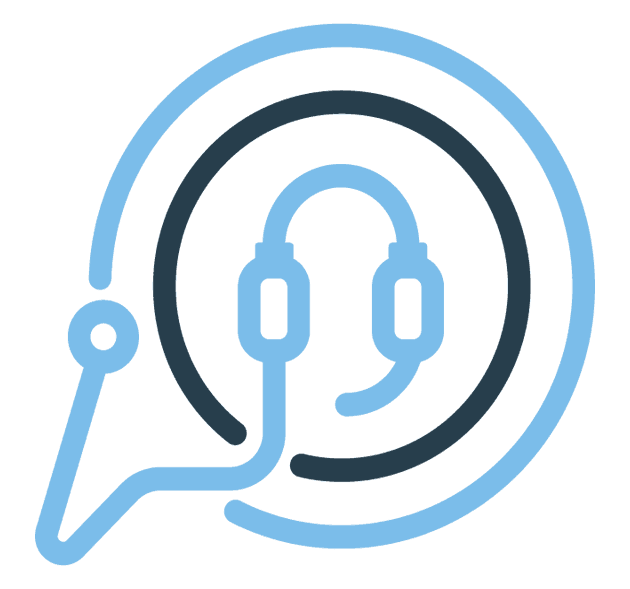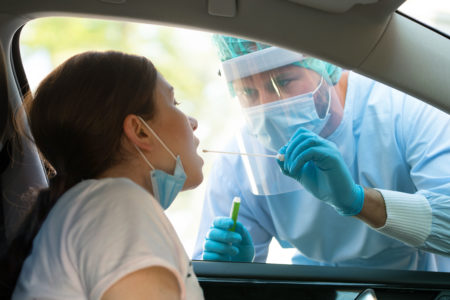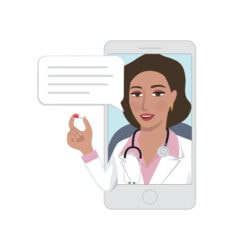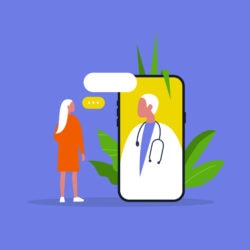Across the country, the news is reporting winding lines of cars at drive-thru testing sites, people waiting for hours to get tested, and others fighting to cut the lines for at-home test kit pickup sites. Just before New Year’s people in Virginia reported waiting three hours to receive testing, others in Denver couldn’t get an appointment because sites had reached capacity, and still others were turned away in Philadelphia because lines were too long.
It’s been one year since the vaccine rollout, but another wave of the pandemic has hit, surging thanks, at least in part, to the highly contagious Omicron variant. The demand for testing is soaring, yet it’s becoming increasingly more difficult to find testing kits for purchase or book an appointment at a testing site.
This new wave is overwhelming many emergency services, hospitals, primary care providers, contract tracers, and even pharmacies that sell testing kits. What’s going on? And what should patients do if they need testing?
Demand for COVID Tests Has Skyrocketed
The omicron surge has caused a boom in demand for testing as more people every day are concerned that they have been infected. Because testing sites are short-staffed and there is a national shortage of testing kits.
At this point, to manage demand and supply, most testing sites have been forced to shift to appointment-only testing. But it can be difficult to get an appointment, especially in the window of time when for which testing would be most beneficial. For example, some facilities in Washington state were fully booked for the following six days. At the end of December, Johns Hopkins Medicine announced that it would only offer COVID-19 testing appointments to patients with a provider’s order due to the rapid spread of the virus in the community.
Testing Kits Are Running Low
“We get phone calls after phone calls asking for at-home COVID tests and we cannot provide for them,” explains pharmacist Ella Vasquez. Since the onset of the Omicron surge, the increased demand for tests has put a strain on the supply. Pharmacies and other retailers are struggling to keep kits in stock or even find a wholesaler with kits available.
In the meantime, customers are calling every day needing testing and the retailers are calling wholesalers daily to check on supply availability. Many have resorted to putting customers on waiting lists to be contacted when a new shipment comes in.
Contact Tracing Systems Are Being Overwhelmed
At the beginning of January, the New York State Health Commissioner announced the suspension of contact tracing for positive COVID-19 cases. When the number of cases was manageable, contact tracing efforts were already challenged by the lack of response. Many of the people called to be interviewed about their symptoms and contacts never picked up their phones. Local health departments guessed that this was due to the assumption that it was a robocall or telemarketer, and others ignored calls to avoid the hassle of getting tested.
Throughout the pandemic, New York residents who tested positive for the virus were called by a state or local health department worker who would ask about their recent contacts. Now, with this latest surge, however, staff can’t keep up with contact tracing. Staffers have been redirected to handling more urgent issues, leaving individuals to quarantine and notify their recent contacts of their positive status on their own.
Calls Are Flooding Emergency Responders
Because of the overflow of calls, emergency response management in many areas has instructed residents not to call for COVID-related symptoms or to request testing. On Jan. 8, for example, the San Francisco Department of Emergency Management posted on Twitter that residents should “only call 911 or go to the emergency department for life-threatening medical emergencies.”
Already, calls to emergency response are generally up about 30% above the average influx. “Please don’t call 911 to ask for a COVID-19 test, or because you have a cold, or minor flu symptoms. We really want to keep our ambulances available for people having a heart attack or strokes,” said SF Fire Department Chief Jeannie Nichols.
Healthcare Staff Is Calling in Sick
Nobody is invincible, and healthcare staff is no exception. Many hospitals and emergency response agencies are currently struggling to cover shifts. In some cities, like San Francisco, hundreds of fire department, police, and frontline medical workers are out of work because of infection or isolation from potential COVID-19 exposure. This strain, on top of the labor shortage that already plagued the nation, is making it difficult for everyone’s calls to get answered, weather for COVID testing or for other health problems.
What Should People Do if They Need Testing?
If you’re experiencing mild to moderate COVID-19-like symptoms or want to get tested:
- DON’T call 911 or clog the phone lines for emergency responders.
- DO visit your local health department’s website where you should find information about COVID testing in your area.
- DON’T go to the emergency room for COVID testing or for mild symptoms. Emergency staff ask for help prioritizing care for patients with urgent or emerging medical needs.
- DO schedule an appointment online.
- DON’T go to a health care facility for evaluation before calling.
- DO call to schedule an appointment or book a telehealth visit if you are concerned about your symptoms.
- DON’T wait in line or make an appointment at a testing facility if it’s optional.
- DO opt for at-home tests or kits from retail pharmacies as availability allows if you are seeking testing for travel, work, or school requirements.
- DON’T provide health insurance, Medicare, or financial information over the phone.
- DO answer calls or texts coming from your local health department.
Need Help Handling the Large Influx in Calls?
Contact PatientCalls. We are a fully HIPAA-compliant answering service for medical offices. We can help testing and tracing facilities to field incoming calls and make appointments as overflow support, after-hours or as a full-time, virtual replacement for your front desk. With PatientCalls you can free up valuable healthcare staff to focus on serving the community.







